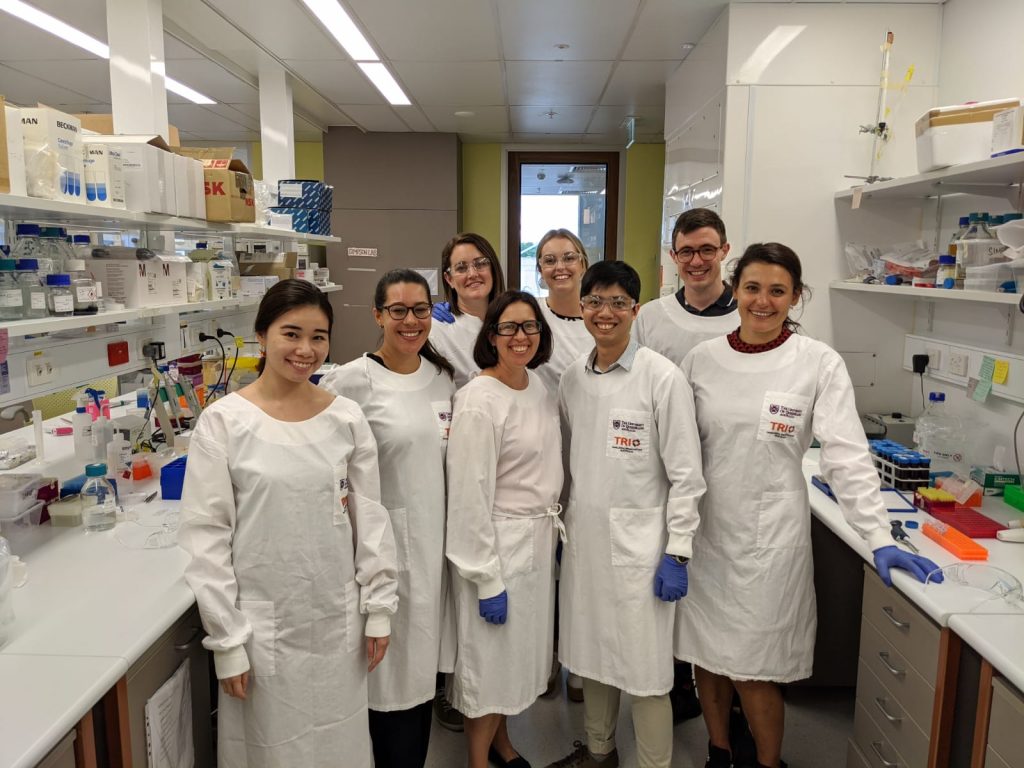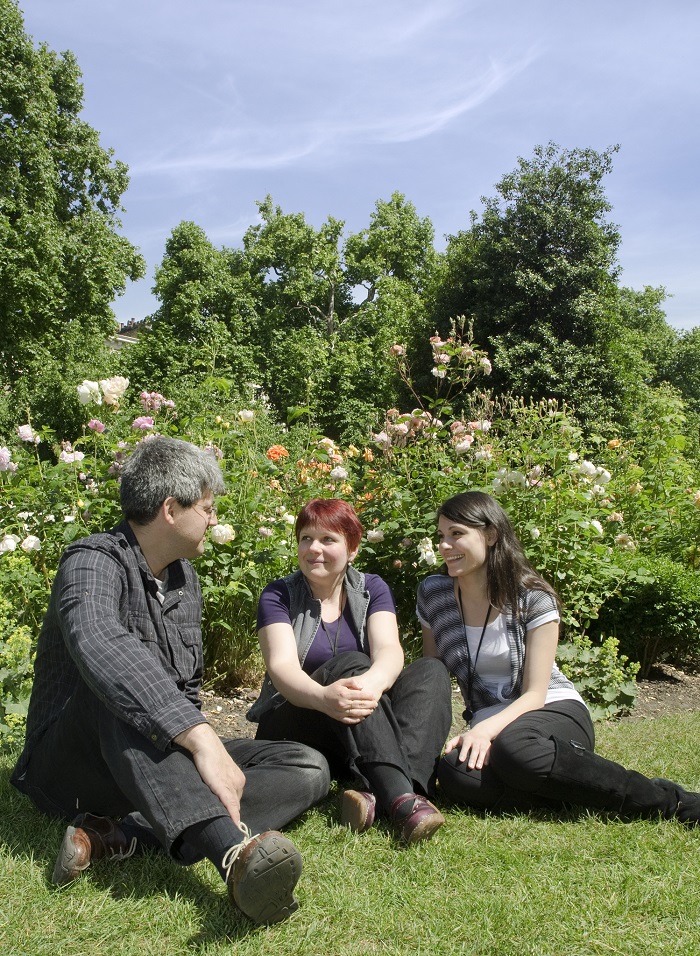Blerida Banushi
March 24, 2021 · 6 min read
Ex Novo – Science behind the scenes
“Ex Novo – Science behind the scenes” is a series of articles born within ISA’s blog in collaboration with the Collegio Nuovo – Fondazione Sandra e Enea Mattei in Pavia, whose students community is marked by a strong presence of women in science. Science is research, long hours to carry out experiments in the laboratory or in the field, but science is also communication, grant writing, entrepreneurship, administration, teaching, project management, leadership and many other facets. We will post articles, interviews and short stories on these multiple aspects of the scientific endeavour. Should you like to contribute with your experience, do not hesitate to get in touch with Michela, ISA’s Head and Collegio Nuovo Alumna, here: michela.bertero@crg.eu.
Would science be possible without resilience?
For this new article, Michela interviewed Blerida Banushi, research fellow at the University of Queensland Diamantina Institute, Australia. We explored with her the role of resilience and perseverance in science.
How did you start your journey in science?
I have been passionate about science since childhood. During high school, I remember reading cell biology and astronomy books in my free time instead of mainstream fiction novels. I was (and still am) very fascinated by how the universe works in its micro and macro scale, and what makes it exist. Untangling the mystery of the unknown has been the force that drove me to research since the very early steps of my career. After being successful on a competition between schools on biology subjects, I gained the confidence that I could build my future around my passion for research and become a good researcher. Nothing better than research places you at the frontiers of knowledge.
How do you choose your research topics? What are you passionate about these days?
I undertook my Bachelor studies in Biological Sciences at the University of Pavia where I was also a fellow at the “Collegio Nuovo” that provided me with privileged conditions of life and study. During the last year of my degree, I was an intern in the laboratory of Prof. Giuseppe Biamonti at the Institute of Molecular Genetics, National Research Council where I had the opportunity to perform research on the expression of genes located in proximity of DNA satellite clusters in the human genome. Upon graduation, I started my Master’s degree in Experimental Biology applied to Biomolecules and Genetics at the same University and I had the opportunity to perform research for two years on Bio-crystallography under the supervision of Prof. Andrea Mattevi.
Afterwards, I obtained a highly competitive Marie Curie Fellowship to fund my PhD between the University of Birmingham, under the supervision of Prof. Paul Gissen, and the University College of London. My PhD project focused on collagen trafficking and cell polarity, and resulted in few peer-reviewed papers, including a first-authored publication in Nature Communications.
During the end of my PhD, I started to see research not only as a path that leads to knowledge and discovery but also as a powerful tool to make a positive impact on the life of others. That is when I started to increase my interest in applied research. I came across the work of the Associate Professor Fiona Simpson at the University of Queensland and I was fascinated by her work not only in the lab but also at the hospital, working with clinicians and patients to develop novel cancer therapies. I joined her lab and started applying the skills I gained in cell biology and protein trafficking during my PhD and the first Postdoc at the University College London to improve the therapeutic options of patients with cancer.
At the same time, I kept cultivating my love for basic science by focusing on a different project in the lab that aims at understanding the function and the regulation of a family of proteins involved in cancer and immunity.

Figure 1. The Simpson´s lab.
With the COVID-19 pandemic, “resilience” has become the new buzz word… is it a buzz word or is it a modus vivendi, fundamental also in a research career?
Over the years, I realised that the concept of research career is something unknown to the general public. I am referring here to academic research I am quite familiar with, through my experience working in different laboratories at international Universities in three different countries (Italy, UK and now Australia). I learnt quite rapidly that resilience is crucial to the research career for multiple reasons. Dealing with the unknown means that scientists continuously adopt the so known “scientific method” that involves infinite trial and error approaches and never ending troubleshooting, where most of the times the research experiments are not successful.
A constant “getting back on your feet” after a failure is a modus vivendi in science, you must familiarize with failure. The biggest discoveries and greatest results in scientific research are made in less than 5% of the time and effort scientists spend researching. Which makes all the 95% of the time spent in failure and frustration worth it all[1]. Scientists are familiar with failure as well as abandoning their egos and cognitive bias when entering the lab.
Apart from the challenges intrinsic to the scientific method that scientists have to face on a daily basis, there is an entire system that scientists have to overcome to succeed in scientific research. Through history, scientists have always had to fight with different institutions of society. You can think of infinite examples, from Galileo to Einstein. The main reason behind this lies in the over mentioned role of scientists in breaking the barrier of the unknown. We as a species do not know how to deal well with the unknown and the unfamiliar.
What is your vision on the profession of a resilient scientist?
While many of you might think that nowadays, science, as a profession, is well rewarded and somehow privileged in society considering its importance for humanity (which has probably become more obvious during the COVID-19 pandemic), the reality is quite different. Apart from conducting their scientific research and publishing it to make it available to the public, part of the researcher’s job consists in having themselves to search for funding so that they can conduct their research as well as have a salary.
Grants available from governments or other institutions are very limited, very competitive and of short duration, so researchers have to continuously submit laborious applications to different funding agencies to increase chances of their proposed work being funded. You can clearly see the holes of a system that is quite broken and very frequently leads to scientists abandoning their research career. This is quite understandable given the uncertainty and instability of the job, which in many cases affects not only the scientists themselves, but also their families. During my research career, I have come across many senior and successful scientists that were unsure if their grants would be renewed and if they would have a job the following month. In some cases, the outcome would be negative so the decision to ‘abandon science’ was not a choice but it was dictated by the research system.
The COVID-19 pandemic has caused a further worsening of the already dramatic research funding situation. For example, cuts in research funding is going to severely impact cancer research and patients outcome as explained in this article published by The Lancet stating: “The Association of Medical Research Charities predicts that it will take more than 4 years for spending in the sector to return to pre-pandemic levels, and a decade to rebuild lost capacity and capability”[2].
Experimenting in the lab, publishing research and securing own funding to be able to survive in science is not everything scientists have to do as part of their role. Other tasks include presenting in conferences, teaching students at universities, engaging with the community and committees in the workplace, reviewing research articles or grants (all tasks completed on a volunteer basis).
You can clearly see that without resilience scientific research would not be possible. While in different professions the sense of reward and motivation that feeds resilience can partially be related to a professional and financial type of reward, to job stability, fame or success, in the case of scientists most of these factors are not present. In my case, but I feel I can speak for all scientists I have encountered along my path, the only force that drives motivation resides in the simple love for science, in the wonder and the curiosity, in the meaning we give to our lives, in the profound desire to make a difference in the world.
Apart from resilience, the support of mentors, supervisors and other colleagues and scientists is another key component for a successful career in science and I am immensely grateful to all scientists who helped me in my research career through mentorships, guidance and friendship.

Figure 2. Talking about science in the park at UCL.
How did you learn to be resilient? Has resilience to do more with change of path or with perseverance?
I think I learned to be resilient from being continuously exposed to adversities, challenges and uncertainties from the young age. From having moved to a new country three times, escaping a difficult economic and political situation in Albania at the age of 13, to concealing my high school studies in a new language with training in athletics and becoming a junior national champion in javelin, to starting a PhD in the UK with limited knowledge of English, to dealing with visa and immigration during my entire adult life since I was a teenager, are few examples I can think of that helped me develop patience and resilience.
Building an open and optimistic mind-set through changing paths but also through interacting with different realities worldwide and putting things in perspective or even viewing the same reality through multiple angles also helps in building resilience.
What is your final message to the new generation of scientists?
You are more important than you realise and our society realises. Keep being perseverant, keep being a scientist. You will make the world a better place for everyone and one day, soon, you will be valued for the important role you have in society.
[1] https://www.nature.com/articles/d41586-019-00107-y
[2] https://www.thelancet.com/journals/lanonc/article/PIIS1470-2045(20)30749-X/fulltext